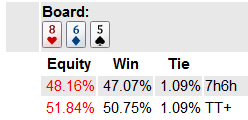I was just recently asked to review this 76 suited hand from 6NL Online, so let’s look at the hand:
Okay, so in this hand there’s a limp, another limp, another limp, and another limp. Here he decides to complete from the small buy with 76s. I would also do the same, but the big blind raises to 7, there’s a call, another call, another call and another call.
So in this situation, hero calls—and I would also be calling this as well—we are getting 6:1, we are closing action, there are multiple sources of implied odds. We do have to remember if we think ahead that when we call there’s going to be 42 big ones in the middle, it’s going to be about 2-2.5 SPR going post flop, which means there’s not going to be a lot of maneuverability and flexibility when it comes to playing draws and single pairs, but that being said, with multiple players involved who at least a couple of them are likely fishy and offering some serious implied odds, it’s going to be a situation where I’m going to call this as well. Again, we’re getting a great price, even though we are going to have poor position, plus we’re also going to have a small SPR pot.
But like I said, going to be calling here. Here does, ends up seeing this board, which is always nice, check, bet for 21, fold, fold, fold, fold, and hero decides to call the 21 big blinds.
Okay, I want to talk about this situation mathematically just for a minute and run it through a fold equity calculator real quick. So we can go back one tick, open up the FPP Pro Fold Equity Calculator, open up Equilab and plug in some things. In the Fold Equity Calculator we just need a few pieces of info, the effective stack that we’d be shoving is 96 big blinds, there is 63 already in the middle, we’re facing a bet of 21 big blinds and then we just need our estimated equity which we can get from Equilab.

So we plugged in our hand, we plug in the board and let’s just assume that our opponent is only going to have tens-plus in this situation when he gets it all in. Say that’s pretty fair, notice that we have 48% equity, plug it in, calculate it, and notice that it’s an all-in, it’s a profitable all-in shove, even if he never, ever folds.
Which means that I want to be shoving this and part of the reason is that if we do call and we brick the turn, what’s the plan? I mean, we really can’t face a shove from him and call it profitably. We are in a situation right now where we know the jam right at this moment is plus EV. It’s not super, super plus EV, but it’s plus EV nonetheless. This is just kind of what happens when you put yourself in a small SPR pot with a drawing hand. When you catch the draw, the normally have to play it very, very fast and aggressive and I’d say this is a much better spot to. I mean, you don’t even need him to be see betting and then see bet folding with something like ace/king. You’re just totally fine in the situation just jamming this.
So I’d say the call is not going to be the best play, that shoving here is going to be much more profitable and you’re able to eyeball this more profitably and more correctly when you practice using a Fold Equity Calculator off the table and practice using Equilab a lot off the table. The more off-table poker study you do with tools like this, the more easily you’re going to be able to recognize plus-EV situations where you can semi-bluff jam just when you’re in real time, simply by doing the practice off the table.
That all being said, let’s look at the rest of the hand because in this spot here it does call 10 of hearts in the turn, check, faces a committing bet of 60 big blinds, and here we are. So at this point we’re getting 2.4:1 on a call. We only need 29% equity to continue, just based on direct pot odds. We have a ton of outs in this situation. We can catch a 6, a 7, a 4, a 9, any heart, and all those cards will most likely give us the best hand like every single time.
Now, if we run this through Equilab and we plug in the 10 of hearts on the turn, you notice that against that tens-plus range, we have 43% equity and it’s pretty, I think pretty fair to say that he would have tens-plus in this situation, he would probably raise that over multiple limpers, he would definitely continuation bet that, and he would definitely bet the turn with that. Even against that pretty worst case, realistic range, we still have 43% equity. This is a pretty easy situation to continue and hero’s fold to me just doesn’t really make any sense. I think he got a little bit nervous for no reason and again, probably hadn’t worked through this stuff enough off the table to have that kind of stuff memorized and be able to quickly estimate his equity.
What I would suggest is hero in this hand definitely spend some time off the table working with a Fold Equity Calculator, working with Equilab and getting this stuff kind of internalized and memorized so that in real time, he’s able to utilize it and make better decisions.
